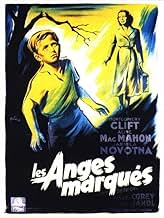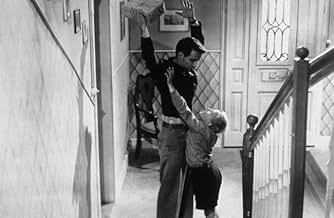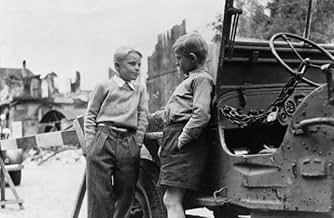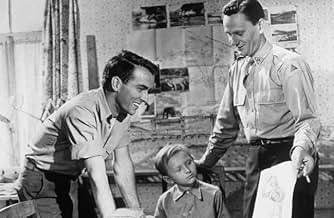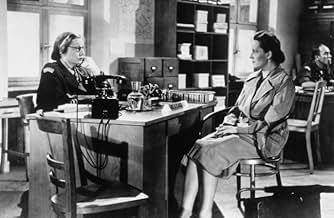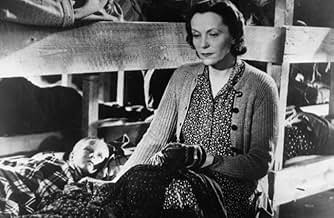AVALIAÇÃO DA IMDb
7,8/10
5,2 mil
SUA AVALIAÇÃO
Na Berlim do pós-guerra, um soldado americano ajuda um garoto tcheco perdido a encontrar sua mãe.Na Berlim do pós-guerra, um soldado americano ajuda um garoto tcheco perdido a encontrar sua mãe.Na Berlim do pós-guerra, um soldado americano ajuda um garoto tcheco perdido a encontrar sua mãe.
- Direção
- Roteiristas
- Artistas
- Ganhou 1 Oscar
- 7 vitórias e 7 indicações no total
Avaliações em destaque
I got to this movie randomly in the night program and found it was rather undeservedly relegated to past 11pm duties on TV. For Germans, it may be hard to chew the past concentration camp experiences of Children survivors in English and American orphanages and the highlighted search of a mother for her young boy, from whom she has been separated during the war. Sentimental : Yes Heart Gripping : Yes Wonderful to watch to the (happy ???) ending ? Yes all over. Great performances by the young boy, Ivan Jandl, the mother and the orphanage manager and very convincing performances of Montgomery Clift and Wendell Corey as teachers and father stand ins. I do know the ending, but it grips me nevertheless, even on replay. And if you're not icy to the heart, it will do the same for you.
I love the old WWII movies and how they portray what life was like for the men and women who served - and what it was like for the families etc. But of all the ones I've seen, I don't think I've seen a single one that highlighted the plight of the children. I'm glad this one chose to bring this sad effect of war to the public in this film.
The movie starts more like a documentary with a female narrator telling part of the story. At times the narration is a little annoying. But most of the rest of the film unfolds naturally without the narration. The film is a heartbreaking tale of the orphaned children of the war. They have nowhere to go and are shuttled from orphanages to resettlement centers. I was so shocked when I first saw the children - they looked so emaciated and dirty. They all seemed to have shell-shocked expressions on their faces. I think the director (Fred Zinneman)did a great job of casting and going for a realistic portrayal and not trying to gloss over the true realities. Being of Austrian Jewish heritage, the story no doubt hit close to home for him.
The actual location shooting in bombed out cities of Germany was also quite stark and realistic. I'm glad they chose not to try to replicate the devastation in a studio. Being filmed in 1948, 3 years after the end of the war - I was shocked to see how much destruction was still evident, with huge piles of rubble laying around. The cities looked deserted.
This was one of Montgomery Clift's first films. He doesn't appear until 36 minutes into film. He delivers a fine performance given his inexperience (although he was experienced on the stage). He is still in possession of his youthful good looks which deteriorated later. Too bad he lived such a young, tragic life as he was quite a natural talent. The young boy is quite a good actor for his age and manages to express his desperation through his body language and action since he doesn't speak for almost 2/3's of the film.
There are many memorable and shocking scenes: the drowning of one of the children, the young boy searching through a crowd of women for his mom, several scenes of his wild and desperate attempts to escape at all costs, and the hordes of children exiting from the train as they arrive at the settlement center. Many of these scenes are some I will never forget.
I'm shocked so few people have seen this (given only 37 comments and 1000+votes on IMDb at this time). I highly recommend this film if you are interested in movies about the sad effects of war.
The movie starts more like a documentary with a female narrator telling part of the story. At times the narration is a little annoying. But most of the rest of the film unfolds naturally without the narration. The film is a heartbreaking tale of the orphaned children of the war. They have nowhere to go and are shuttled from orphanages to resettlement centers. I was so shocked when I first saw the children - they looked so emaciated and dirty. They all seemed to have shell-shocked expressions on their faces. I think the director (Fred Zinneman)did a great job of casting and going for a realistic portrayal and not trying to gloss over the true realities. Being of Austrian Jewish heritage, the story no doubt hit close to home for him.
The actual location shooting in bombed out cities of Germany was also quite stark and realistic. I'm glad they chose not to try to replicate the devastation in a studio. Being filmed in 1948, 3 years after the end of the war - I was shocked to see how much destruction was still evident, with huge piles of rubble laying around. The cities looked deserted.
This was one of Montgomery Clift's first films. He doesn't appear until 36 minutes into film. He delivers a fine performance given his inexperience (although he was experienced on the stage). He is still in possession of his youthful good looks which deteriorated later. Too bad he lived such a young, tragic life as he was quite a natural talent. The young boy is quite a good actor for his age and manages to express his desperation through his body language and action since he doesn't speak for almost 2/3's of the film.
There are many memorable and shocking scenes: the drowning of one of the children, the young boy searching through a crowd of women for his mom, several scenes of his wild and desperate attempts to escape at all costs, and the hordes of children exiting from the train as they arrive at the settlement center. Many of these scenes are some I will never forget.
I'm shocked so few people have seen this (given only 37 comments and 1000+votes on IMDb at this time). I highly recommend this film if you are interested in movies about the sad effects of war.
After watching Roberto Rossellini's 1947 final part of his war trilogy "Germania anno zero", Fred Zinnemann's "The Search" is in direct contrast. While Rossellini approaches a similar subject with absorbing objectivity, "The Search" opts for sentimentality, although Zinnemann tried to add a documentary dimension to the story. It's the tale of a boy who is rescued by an American G.I. in Berlin, while the boy's mother is looking for him in refugee camps, after they were separated in Auschwitz during the war. Mother and child are pretty close but do not know it, so the story goes from scenes of the soldier educating the boy, to the mother's giving love to surrogate sons in a UN home for war orphans. Zinnemann's tact (or lack of passion, as some may say) nevertheless makes it work, as well as the performances by Montgomery Clift as the soldier and young Ivan Jandl as the kid, who won a special Oscar.
MONTGOMERY CLIFT is the nominal star of THE SEARCH but it's little Ivan Jandl that audiences were likely to remember after watching this spellbinding story of his plight as a victim of war amid separation from his mother. Clift is firmly in command of his role as a compassionate soldier who takes the boy under his wing and teaches him to communicate in English. Wendell Corey is excellent as a soldier friend of Clift and opera singer Jarmila Novotna is totally convincing as the boy's mother intent on being reunited with her son.
Another pivotal role is filled brilliantly by ALINE MacMAHON in a part that surely deserved an award nomination. At any rate, Clift deserved his nomination as Best Actor and Ivan Jandl fully deserved his special Oscar as the juvenile lead. His facial expression and eyes tell the whole story without a single bit of dialogue. The only other child actor I can compare him with (at that time) is Claude Jarman, Jr. who showed a natural skill for performing at a tender age.
The impact of the devastation of war on ruined buildings is caught by the camera vividly in on location footage shot in Germany under Fred Zinnemann's expert direction. But it's the impact of war on the very young children that is the focus of this film and to that end it succeeds brilliantly in capturing the grief and loneliness of all those victims of war in a way that is sure to stir your emotions.
Summing up: gritty post-war film, honest emotionally and powerful in its presentation. Highly recommended.
Another pivotal role is filled brilliantly by ALINE MacMAHON in a part that surely deserved an award nomination. At any rate, Clift deserved his nomination as Best Actor and Ivan Jandl fully deserved his special Oscar as the juvenile lead. His facial expression and eyes tell the whole story without a single bit of dialogue. The only other child actor I can compare him with (at that time) is Claude Jarman, Jr. who showed a natural skill for performing at a tender age.
The impact of the devastation of war on ruined buildings is caught by the camera vividly in on location footage shot in Germany under Fred Zinnemann's expert direction. But it's the impact of war on the very young children that is the focus of this film and to that end it succeeds brilliantly in capturing the grief and loneliness of all those victims of war in a way that is sure to stir your emotions.
Summing up: gritty post-war film, honest emotionally and powerful in its presentation. Highly recommended.
Enjoyed this film from beginning to the very end because of a great story about children who were separated from their parents by Nazi Germany and they were also placed in concentration camps and marked with a number like cattle. Montgomery Clift, (Steve Stevenson) plays the role as an Army personnel who finds a very young boy who is starving and gives him some of his lunch. This young boy is named Karel Malik, (Ivan Jandl) who learns to speak English from Steve and starts to forget some of his horrible experiences. However, Karel begins to want to find his mother who is Mrs. Hannah Malik and Hannah is searching all through the ruins of bombed out towns trying to find her son. There is great acting by Montgomery Clift and Wendell Corey and this is a horrible story about the effects Hitler had on young children, men and women who were treated like animals. Great Gem of a Film !.
Você sabia?
- CuriosidadesBen Mankiewicz on TCM indicated that Ivan Jandl spoke no English at the time this film was made, and that his English dialogue was phonetically memorized.
- Erros de gravaçãoOn Montgomery Clift's right shoulder, he wears the patch of the 102nd infantry division, but it is sewed on incorrectly; it is turned 90 degrees to the right.
- Citações
[Steve is teaching a young boy, whose name he does not know but has coined Jim, to speak English]
Ralph 'Steve' Stevenson: [to Jim] You have no idea how useful it's going to be for you to know English. You can go where ever you like. Everybody knows what 'OK' means. You can use English all over the world. Not, not just America: Canada, Africa, Australia, India. Even in England, they understand English... well, sort of.
- Versões alternativasThere is an Italian edition of this film on DVD, distributed by DNA srl, "LA SETTIMA CROCE (1944) + THE SEARCH (Odissea tragica, 1948)" (2 Films on a single DVD), re-edited with the contribution of film historian Riccardo Cusin. This version is also available for streaming on some platforms.
- ConexõesFeatured in Imaginary Witness: Hollywood and the Holocaust (2004)
Principais escolhas
Faça login para avaliar e ver a lista de recomendações personalizadas
- How long is The Search?Fornecido pela Alexa
Detalhes
- Data de lançamento
- Países de origem
- Idiomas
- Também conhecido como
- La búsqueda
- Locações de filme
- Empresa de produção
- Consulte mais créditos da empresa na IMDbPro
Bilheteria
- Orçamento
- US$ 250.000 (estimativa)
- Tempo de duração
- 1 h 44 min(104 min)
- Cor
- Mixagem de som
- Proporção
- 1.37 : 1
Contribua para esta página
Sugerir uma alteração ou adicionar conteúdo ausente


